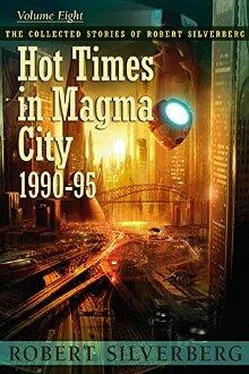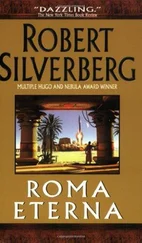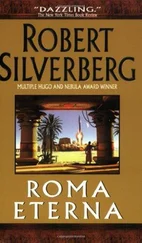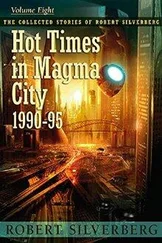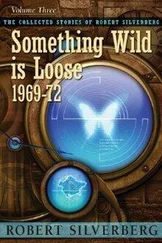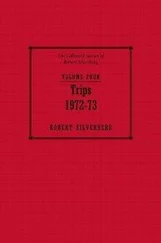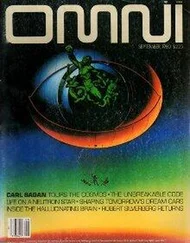Robert Silverberg - We Are for the Dark
Здесь есть возможность читать онлайн «Robert Silverberg - We Are for the Dark» весь текст электронной книги совершенно бесплатно (целиком полную версию без сокращений). В некоторых случаях можно слушать аудио, скачать через торрент в формате fb2 и присутствует краткое содержание. Год выпуска: 2014, ISBN: 2014, Издательство: Subterranean Press, Жанр: Фантастика и фэнтези, на английском языке. Описание произведения, (предисловие) а так же отзывы посетителей доступны на портале библиотеки ЛибКат.
- Название:We Are for the Dark
- Автор:
- Издательство:Subterranean Press
- Жанр:
- Год:2014
- ISBN:978-1-59606-693-9
- Рейтинг книги:3 / 5. Голосов: 1
-
Избранное:Добавить в избранное
- Отзывы:
-
Ваша оценка:
- 60
- 1
- 2
- 3
- 4
- 5
We Are for the Dark: краткое содержание, описание и аннотация
Предлагаем к чтению аннотацию, описание, краткое содержание или предисловие (зависит от того, что написал сам автор книги «We Are for the Dark»). Если вы не нашли необходимую информацию о книге — напишите в комментариях, мы постараемся отыскать её.
We Are for the Dark — читать онлайн бесплатно полную книгу (весь текст) целиком
Ниже представлен текст книги, разбитый по страницам. Система сохранения места последней прочитанной страницы, позволяет с удобством читать онлайн бесплатно книгу «We Are for the Dark», без необходимости каждый раз заново искать на чём Вы остановились. Поставьте закладку, и сможете в любой момент перейти на страницу, на которой закончили чтение.
Интервал:
Закладка:
“Never. What is it?”
“We call it a bolshoi. Animal of the northern steppe, very big. You see one five kilometers away and you shit your trousers, I tell you for true.” He grins. “Maybe we send one back to Earth some day to show them what we have here. Maybe.”
His Anglic is much more heavily accented than Marfa Ivanovna’s, and far less fluent. He seems unable to hold still very long. The district that he governs, he tells me, is the largest on Zima. It looks immense indeed on his map, a vast blue area, a territory that seems to be about the size of Brazil. But when I take a closer look I see three tiny dots clustered close together in the center of the blue zone. They are, I assume, the only villages. He follows my gaze and strides immediately across the room to tap the map. “This is Tyomni,” he says. “That is this village. This one here, it is Doch. This one, Sin. In this territory we have six thousand people altogether. There are two other territories, here and here.” He points to regions north and south of the blue zone. A yellow area and a pink one indicate the other settlements, each with two towns. The whole human population of this planet must be no more than ten thousand.
Turning suddenly toward me, he says, “You are big priest in the Order?”
“I was Lord Magistrate, yes. The House of Senders.”
“Senders. Ah. I know Senders. The ones who choose the colonists. And who run the machinery, the transmitters.”
“That’s right.”
“And you are the bolshoi Sender? The big man, the boss, the captain?”
“I was, yes. This robe, this medallion, those are signs of my office.”
“A very big man. Only instead of sending, you are sent.”
“Yes,” I say.
“And you come here, why? Nobody from Earth comes here in ten, fifteen years.” He no longer makes even an attempt to conceal his suspicions, or his hostility. His cold eyes flare with anger. “Being boss of Senders is not enough for you? You want to tell us how to run Zima? You want to run Zima yourself?”
“Nothing of that sort, believe me.”
“Then what?”
“Do you have a map of the entire Dark?”
“The Dark,” he says, as though the word is unfamiliar to him. Then he says something in Russkiye to one of the boyars. The man leaves the room and returns, a few moments later, with a wide, flat black screen that turns out to be a small version of the wall screen in the Master’s office. He lights it and they all look expectantly at me.
The display is a little different from the one I am accustomed to, since it centers on Zima, not on Earth, but the glowing inner sphere that marks the location of the Mission stars is easy enough to find. I point to that sphere and I remind them, apologizing for telling them what they already know, that the great plan of the Mission calls for an orderly expansion through space from Earth in a carefully delimited zone a hundred light-years in diameter. Only when that sphere has been settled are we to go farther, not because there are any technical difficulties in sending our carrier ships a thousand light-years out, or ten thousand, but because the Master has felt from the start that we must assimilate our first immense wave of outward movement, must pause and come to an understanding of what it is like to have created a galactic empire on so vast a scale, before we attempt to go onward into the infinity that awaits us. Otherwise, I say, we risk falling victim to a megalomaniacal centrifugal dizziness from which we may never recover. And so Darklaw forbids journeys beyond the boundary.
They watch me stonily throughout my recital of these overfamiliar concepts, saying nothing.
I go on to tell them that Earth now is receiving indications that voyages far beyond the hundred-light-year limit have taken place.
Their faces are expressionless.
“What is that to us?” the voivode asks.
“One of the deviant tracks begins here,” I say.
“Our Anglic is very poor. Perhaps you can say that another way.”
“When the first ship brought the Velde receiver to Zima, it built replicas of itself and of the receiver, and sent them onward to other stars farther from Earth. We’ve traced the various trajectories that lead beyond the Mission boundaries, and one of them comes out of a world that received its Velde equipment from a world that got its equipment from here. A granddaughter world, so to speak.”
“This has nothing to do with us, nothing at all,” the voivode says coolly.
“Zima is only my starting point,” I say. “It may be that you are in contact with these outer worlds, that I can get some clue from you about who is making these voyages, and why, and where he’s setting out from.”
“We have no knowledge of any of this.”
I point out, trying not to do it in any overbearing way, that by the authority of Darklaw vested in me as a Plenipotentiary of the Order he is required to assist me in my inquiry. But there is no way to brandish the authority of Darklaw that is not overbearing, and I see the voivode stiffen at once, I see his face grow black, I see very clearly that he regards himself as autonomous and his world as independent of Earth.
That comes as no surprise to me. We were not so naive, so innocent of historical precedent, as to think we could maintain control over the colonies. What we wanted was quite the opposite, new Earths free of our grasp—cut off, indeed, by an inflexible law forbidding all contact between mother world and colony once the colony has been established—and free, likewise, of the compulsion to replicate the tragic mistakes that the old Earth had made. But because we had felt the hand of God guiding us in every way as we led mankind forth into the Dark, we believed that God’s law as we understood it would never be repudiated by those whom we had given the stars. Now, seeing evidence that His law is subordinate out here to the will of wilful men, I fear for the structure that we have devoted our lives to building.
“If this is why you really have come,” the voivode says, “then you have wasted your time. But perhaps I misunderstand everything you say. My Anglic is not good. We must talk again.” He gestures to the boyars and says something in Russkiye that is unmistakably a dismissal. They take me away and give me a room in some sort of dreary lodging-house overlooking the plaza at the center of town. When they leave, they lock the door behind them. I am a prisoner.
It is a harsh land. In the first few days of my internment there is a snowstorm every afternoon. First the sky turns metal-gray, and then black. Then hard little pellets of snow, driven by the rising wind, strike the window. Then it comes down in heavy fluffy flakes for several hours. Afterwards machines scuttle out and clear the pathways. I have never before been in a place where they have snow. It seems quite beautiful to me, a kind of benediction, a cleansing cover.
This is a very small town, and there is wilderness all around it. On the second day and again on the third, packs of wild beasts go racing through the central plaza. They look something like huge dogs, but they have very long legs, almost like those of horses, and their tails are tipped with three pairs of ugly-looking spikes. They move through the town like a whirlwind, prowling in the trash, butting their heads against the closed doors, and everyone gets quickly out of their way.
Later on the third day there is an execution in the plaza, practically below my window. A jowly, heavily bearded man clad in furs is led forth, strapped to a post, and shot by five men in uniforms. For all I can tell, he is one of the three boyars who took me to the voivode on my first day. I have never seen anyone killed before, and the whole event has such a strange, dreamlike quality for me that the shock and horror and revulsion do not strike me until perhaps half an hour later.
Читать дальшеИнтервал:
Закладка:
Похожие книги на «We Are for the Dark»
Представляем Вашему вниманию похожие книги на «We Are for the Dark» списком для выбора. Мы отобрали схожую по названию и смыслу литературу в надежде предоставить читателям больше вариантов отыскать новые, интересные, ещё непрочитанные произведения.
Обсуждение, отзывы о книге «We Are for the Dark» и просто собственные мнения читателей. Оставьте ваши комментарии, напишите, что Вы думаете о произведении, его смысле или главных героях. Укажите что конкретно понравилось, а что нет, и почему Вы так считаете.
